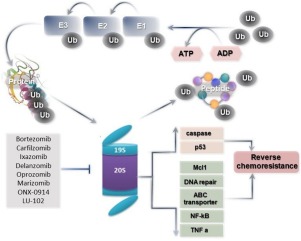Drug Resistance Updates ( IF 15.8 ) Pub Date : 2019-11-11 , DOI: 10.1016/j.drup.2019.100663 Silpa Narayanan 1 , Chao-Yun Cai 1 , Yehuda G Assaraf 2 , Hui-Qin Guo 3 , Qingbin Cui 4 , Liuya Wei 5 , Juan-Juan Huang 6 , Charles R Ashby 1 , Zhe-Sheng Chen 1

|
Drug resistance is a major obstacle in the field of pre-clinical and clinical therapeutics. The development of novel technologies and targeted therapies have yielded new modalities to overcome drug resistance, but multidrug resistance (MDR) remains one of the major challenges in the treatment of cancer. The ubiquitin-proteasome system (UPS) has a central role in regulating the levels and activities of a multitude of proteins as well as regulation of cell cycle, gene expression, response to oxidative stress, cell survival, cell proliferation and apoptosis. Therefore, inhibition of the UPS could represent a novel strategy for the treatment and overcoming of drug resistance in chemoresistant malignancies. In 2003, bortezomib was approved by the FDA for the treatment of multiple myeloma (MM). However, due to its limitations, second generation proteasome inhibitors (PIs) like carfilzomib, ixazomib, oprozomib, delanzomib and marizomib were introduced which displayed clinical activity in bortezomib-resistant tumors. Past studies have demonstrated that proteasome inhibition potentiates the anti-cancer efficacy of other chemotherapeutic drugs by: i) decreasing the expression of anti-apoptotic proteins such as TNF-α and NF-kB, ii) increasing the levels of Noxa, a pro-apoptotic protein, iii) activating caspases and inducing apoptosis, iv) degrading the pro-survival protein, induced myeloid leukemia cell differentiation protein (MCL1), and v) inhibiting drug efflux transporters. In addition, the mechanism of action of the immunoproteasome inhibitors, ONX-0914 and LU-102, suggested their therapeutic role in the combination treatment with PIs. In the current review, we discuss various PIs and their underlying mechanisms in surmounting anti-tumor drug resistance when used in combination with conventional chemotherapeutic agents.
中文翻译:

靶向泛素-蛋白酶体途径以克服抗癌药物耐药性。
耐药性是临床前和临床治疗领域的主要障碍。新技术和靶向疗法的发展产生了克服耐药性的新方法,但是多药耐药性(MDR)仍然是癌症治疗中的主要挑战之一。泛素-蛋白酶体系统(UPS)在调节多种蛋白质的水平和活性以及调节细胞周期,基因表达,对氧化应激的反应,细胞存活,细胞增殖和凋亡方面起着核心作用。因此,抑制UPS可能代表了一种治疗和克服化学耐药性恶性肿瘤耐药性的新策略。2003年,硼替佐米被FDA批准用于治疗多发性骨髓瘤(MM)。但是,由于其局限性,引入了第二代蛋白酶体抑制剂(PIs),如卡非佐米,依沙佐米,阿普洛佐米,地兰佐米和马利佐米,这些药物在耐硼替佐米的肿瘤中表现出临床活性。过去的研究表明,蛋白酶体抑制作用可通过以下方式增强其他化疗药物的抗癌功效:i)降低抗凋亡蛋白(如TNF-α和NF-kB)的表达,ii)增加Noxa(一种抗癌蛋白)的水平凋亡蛋白,iii)激活胱天蛋白酶并诱导凋亡,iv)降解促生存蛋白,诱导髓样白血病细胞分化蛋白( MCL1)和v)抑制药物外排转运蛋白。此外,免疫蛋白酶体抑制剂ONX-0914和LU-102的作用机制表明它们在与PI联合治疗中的治疗作用。在当前的审查中,我们讨论了各种PI及其与常规化学治疗剂联合使用时克服抗肿瘤药耐药性的潜在机制。











































 京公网安备 11010802027423号
京公网安备 11010802027423号